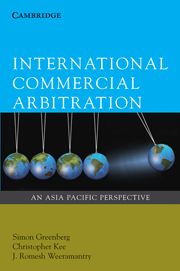Book contents
- Frontmatter
- Contents
- Foreword
- Preface
- Table of Cases
- Table of Statutes
- 1 Introduction to international arbitration and its place in the Asia-Pacific
- 2 Law governing the arbitration and role of the seat
- 3 Applicable substantive law
- 4 Arbitration agreement
- 5 Arbitral jurisdiction
- 6 The arbitral tribunal
- 7 Procedure and evidence
- 8 The award
- 9 The award
- 10 Investment treaty arbitration
- Appendix 1 Asia-Pacific arbitral institutions at a glance
- Appendix 2 Selected arbitral institutions
- Appendix 3 List of UNCITRAL Model Law countries
- Appendix 4 List of parties to the New York Convention 1958
- Appendix 5 Selected list of Asia-Pacific arbitration legislation and instruments
- Glossary
- Index
6 - The arbitral tribunal
Published online by Cambridge University Press: 05 June 2012
- Frontmatter
- Contents
- Foreword
- Preface
- Table of Cases
- Table of Statutes
- 1 Introduction to international arbitration and its place in the Asia-Pacific
- 2 Law governing the arbitration and role of the seat
- 3 Applicable substantive law
- 4 Arbitration agreement
- 5 Arbitral jurisdiction
- 6 The arbitral tribunal
- 7 Procedure and evidence
- 8 The award
- 9 The award
- 10 Investment treaty arbitration
- Appendix 1 Asia-Pacific arbitral institutions at a glance
- Appendix 2 Selected arbitral institutions
- Appendix 3 List of UNCITRAL Model Law countries
- Appendix 4 List of parties to the New York Convention 1958
- Appendix 5 Selected list of Asia-Pacific arbitration legislation and instruments
- Glossary
- Index
Summary
Introduction
High quality arbitrators are an essential ingredient of effective arbitration proceedings. As arbitration specialists have noted, ‘[t]he reputation and acceptability of international arbitration depends on the quality of the arbitrators themselves’. The composition of the arbitral tribunal can significantly affect a range of important factors including whether the arbitration is conducted efficiently and economically, whether the award is susceptible to challenge, and even an individual party's chances of success or failure. Issues surrounding the constitution of the arbitral tribunal therefore deserve special attention.
This chapter follows the life cycle of an arbitral tribunal chronologically. Section 2 describes how an arbitral tribunal is constituted, including the number of arbitrators and their appointment in multiparty arbitrations. In Section 3 we discuss the process of choosing an arbitrator, whether as chairperson, sole arbitrator or party-nominated co-arbitrator, as well as the qualities and qualifications that are generally desirable for international arbitrators. The formal appointment process is discussed in Section 4. In Section 5 we examine the obligations of arbitrators, such as diligence, impartiality and independence, and disclosure of potential conflicts of interest. Section 6 deals with challenges to arbitrators. Finally, issues relating to the resignation, removal and replacement of arbitrators are addressed in Section 7.
Constitution of the arbitral tribunal
The main principle guiding the appointment of arbitrators is party autonomy. In their contract or even after a dispute arises, parties are free to agree on the number of arbitrators, how they will be appointed, and who they will be.
- Type
- Chapter
- Information
- International Commercial ArbitrationAn Asia-Pacific Perspective, pp. 245 - 303Publisher: Cambridge University PressPrint publication year: 2010



